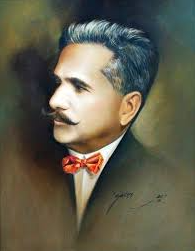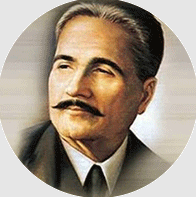Views: 694
Allama Iqbal Biography:
Sir Allama Iqbal (1877-1938) was a Pakistani poet, philosopher, and politician. He is widely regarded as one of the most important figures in Urdu literature and is considered the national poet of Pakistan.Iqbal was born in Sialkot, Punjab, British India (now Pakistan) to a family of modest means. He received his early education in Sialkot and later studied at the Government College in Lahore, where he earned a Bachelor of Arts degree. He then went on to study law at Cambridge University and was called to the bar in 1906.Allama Iqbal’s personal life was marked by simplicity, humility, and a deep commitment to his family and faith,
- Family: Iqbal was born into a Kashmiri family in Sialkot, Punjab (now Pakistan). His father, Sheikh Noor Muhammad, was a clerk, and his mother, Imam Bibi, was a homemaker.
- Marriage: Iqbal married Karim Bibi in 1895, and they had three children: Aftab (son), Miraj Begum (daughter), and Javid Iqbal (son).

- Simple living: Despite his fame and intellectual stature, Iqbal lived a simple life, preferring traditional clothing and avoiding luxuries.
- Spiritual pursuits: Iqbal was deeply interested in Sufism and spirituality, and he was influenced by the teachings of Rumi and other Sufi saints.
- Love for nature: Allama Iqbal had a profound appreciation for nature and often drew inspiration from it in his poetry.
- Health issues: Iqbal suffered from various health problems, including throat cancer, which eventually led to his death in 1938.
- Devotion to family: Iqbal was deeply devoted to his family and prioritized their well-being and education.
- Humility: Despite his intellectual achievements and fame, Iqbal remained humble and grounded, often referring to himself as a “poet of the people.
- Education: Allama Iqbal was a self-taught scholar who pursued higher education in Lahore, Cambridge, and Munich. He earned a Bachelor’s degree in Arabic and a PhD in Philosophy from Munich University.
- Teaching career: Iqbal taught Arabic and English literature at Oriental College in Lahore and later became a professor of philosophy at Government College.
- Law practice: Iqbal was also a practicing lawyer and argued cases in the Lahore High Court.
- Poetry and writing: Allama Iqbal wrote poetry and prose in Urdu, Persian, and English, and his works include “Shikwa” and “Jawab-e-Shikwa” (Complaint and Answer to the Complaint), “Payam-e-Mashriq” (Message from the East), and “Zabur-e-Ajam” (Persian Psalms).
- Spiritual mentor: Iqbal was deeply influenced by his spiritual mentor, Sheikh Abdullah Ansari, a Sufi saint from Afghanistan.
- Travel: Iqbal traveled extensively throughout Europe, the Middle East, and Asia, which broadened his intellectual and cultural horizons.
- Family legacy: Iqbal’s sons, Aftab and Javid, went on to become prominent figures in Pakistani politics and academia, respectively.
- Personal struggles: Allama Iqbal faced personal struggles, including the loss of his first wife, Karim Bibi, and his own declining health in later life.
Allama Iqbal Career:
Iqbal started his career as a lawyer but soon turned to writing and politics. He was a strong advocate for Indian independence from British rule and was involved in the Indian nationalist movement. In 1908, he founded the Anjuman-e-Himayat-e-Islam, an organization dedicated to promoting Muslim welfare and education.
Philosophy:
Allama Iqbal’s philosophy focused on the concept of “Khudi” (selfhood) and the importance of individual identity and self-discovery. He believed in the power of the human spirit and the potential for individuals to achieve greatness through self-realization.
Legacy:
Allama Iqbal’s legacy extends far beyond his literary and philosophical works. He is considered a national hero in Pakistan and his birthday, November 9, is celebrated as a national holiday. His philosophy and ideas continue to inspire people around the world.

Some of his notable quotes include:
- “Be aware of your worth, and never surrender to the forces of nature.”
- “The ultimate aim of life is to make the ideal real.”
- “The future belongs to those who believe in the beauty of their dreams.”
Literary Works:
Iqbal’s poetry and philosophical works are considered some of the greatest in Urdu literature. His most famous works include:
- “Shikwa” (Complaint)
- “Jawab-e-Shikwa” (Answer to the Complaint)
- “Payam-e-Mashriq” (Message from the East)
- “Zabur-e-Ajam” (Persian Psalms)
- “Lalay-e-Tur” (Tulip of the Desert)
- “Nalay e Yatem” (1899): This is a famous poem of Allama Iqbal that he recited at the annual meeting of Anjuman-e-Himayat-e-Islam in Lahore.
- “Tarana-e-Hind” (1924): Also known as “Saare Jahan Se Achcha,” this collection of Urdu poetry is considered one of the most famous works of Allama Iqbal.
- “Asrar-i-Khudi” (1915): This book is considered the first phase of Iqbal’s poetry and reflects the blend of Persian mysticism and patriotism.
- “Rumuz-i-Bekhudi” (1918): This book is another famous work of Iqbal that is considered as part of the first phase of his poetry.
- “Payam-i-Mashriq” (1923): This book is another example of Iqbal’s poetic works that is considered as part of his first phase of poetry.
- “Zabur-i-Ajam” (1932): This book is another famous work of Iqbal that is considered as part of the first phase of his poetry.
- “Javid Nama” (1936): This book is another famous work of Iqbal that is considered as part of the first phase of his poetry.
- “Ilmul Iqtisad” (1904): This book is Iqbal’s first published work and is an introductory economics textbook.
- Also Visit: https://poetrypk.com/shikwa-the-complaint-best-no1-strong-poem-by-iqbal/
Written by Arslan
Allama Iqbal’s political life: 
Allama Iqbal’s political life was marked by his advocacy for Indian independence and Muslim rights. Here’s a brief overview:
- Early involvement: Iqbal was involved in politics from his early days, participating in the Indian National Congress and the Muslim League.
- Muslim League: In 1908, Iqbal joined the Muslim League and became a key figure in the party. He advocated for separate electorates for Muslims and emphasized the importance of Muslim representation in government.
- Presidential Address (1930): Iqbal delivered the presidential address at the Muslim League’s annual session in Allahabad, where he presented his vision for a separate Muslim state in India.
- Two-Nation Theory: Iqbal was a proponent of the Two-Nation Theory, which held that Hindus and Muslims were two distinct nations with different cultures, histories, and values.
- Demand for Pakistan: Iqbal’s political efforts ultimately contributed to the creation of Pakistan in 1947, although he did not live to see it.
- Influence on Jinnah: Iqbal’s ideas and vision had a significant impact on Muhammad Ali Jinnah, who later became the founder of Pakistan.
Throughout his political life, Iqbal emphasized the importance of Muslim unity, self-determination, and cultural preservation. His political philosophy continues to influence political discourse in Pakistan and beyond.
Iqbal, Jinnah, and concept of Pakistan
Ideologically separated from Congress Muslim leaders, Allama Iqbal had also been disillusioned with the politicians of the Muslim League, owing to the factional conflict that plagued the League in the 1920s. Citation needed Discontent with factional leaders like Shafi and Fazl-ur-Rahman, Iqbal came to believe that only Jinnah was a political leader capable of preserving unity and fulfilling the

I know you are a busy man, but I do hope you won’t mind my writing to you often, as you are the only Muslim in India today to whom the community has the right to look up for safe guidance through the storm which is coming to North-West India and, perhaps, to the whole of India.
While Allama Iqbal espoused the idea of Muslim-majority provinces in 1930, Jinnah would continue to hold talks with the Congress through the decade and only officially embraced the goal of Pakistan in 1940. Some historians postulate that Jinnah always remained hopeful for an agreement with the Congress and never fully desired the partition of India.Iqbal’s close correspondence with Jinnah is speculated by some historians as having been responsible for Jinnah’s embrace of the idea of Pakistan. Iqbal elucidated to Jinnah his vision of a separate Muslim state in a letter sent on 21 June 1937:
A separate federation of Muslim Provinces, reformed on the lines I have suggested above, is the only course by which we can secure a peaceful India and save Muslims from the domination of Non-Muslims. Why should not the Muslims of North-West India and Bengal be considered as nations entitled to self-determination just as other nations in India and outside India are.
There is only one way out. Muslims should strengthen Jinnah’s hands. They should join the Muslim League. Indian question, as is now being solved, can be countered by our united front against both the Hindus and the English. Without it, our demands are not going to be accepted. People say our demands smack of Communalism. This is sheer propaganda. These demands relate to the defense of our national existence. The united front can be formed under the leadership of the Muslim League. And the Muslim League can succeed only on account of Jinnah. Now, none but Jinnah is capable of leading the Muslims.
Death:
Iqbal died on 21th April 1938 due to severe throat infection that lasted for long till his death. He will be remembered for good.
Aasmaan teri lahad per shabnam afshaani kare
Sabza e noorasta is ghar ki nigeh baani kare.
Written by Arslan

1 Comment
Add a Comment